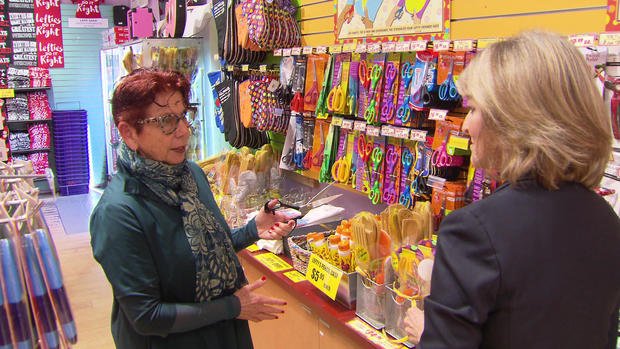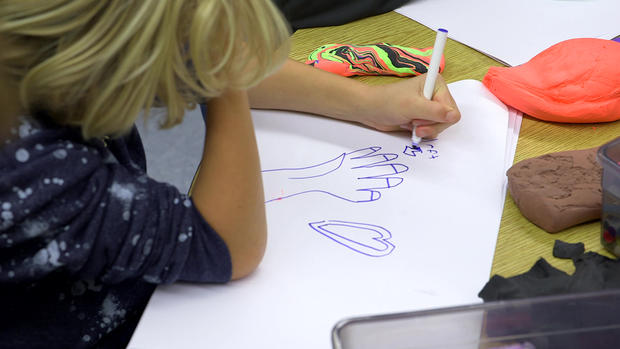What's the right way to think about the left-handed?
They could be items found at any gift and gadget shop – scissors, pens, notebooks – but these, and scores of other products in this store, are specifically designed for left-handed people.
Take the pastry server, with its sharp cutting edge on the left side. "The correct side, we like to say!" said Margaret Majua.
You may recall the Leftorium from "The Simpsons," which sold products specifically for left-handed people. But Lefty's, opened by Majua in San Francisco in 2008, is the real thing.
Correspondent Rita Braver (a southpaw herself) asked, "You're not a lefty?"
"No, no, I can't even fake it," Majua replied. "I'm terrible with my left hand."
No surprise. Lefties make up only an estimated 10 percent of the world's population, and Majua understands that they sometimes feel, well, left out.
Of course, Braver notes, "We lefties do have greatness in our ranks." Among them: artists (Michelangelo, Pablo Picasso, Leonardo da Vinci), actors (Charlie Chaplin, Julia Roberts, Brad Pitt), musicians (Paul McCartney, Jimi Hendrix, Kurt Cobain), techies (Bill Gates, Steve Jobs, Mark Zuckerberg), and eight of 45 U.S. presidents, including former President Bill Clinton.
"We seem to be over-represented in certain fields," Mr. Clinton said. "Politics? Safe-cracking? I don't know!"
"Has it ever impeded you?" Braver asked.
"No, I don't think it's ever impeded me," Clinton said. "When I started studying the way the brain functions, it made me wonder whether it really was a sign of being a little more creative and non-rational in the way you think. And I have no conclusions on it."
"Even about yourself?"
"No, I don't!"
When asked about the "myth" that lefties are more creative, author and journalist David Wolman said, "Oh, let's kill it, together, here and now, let's just kill it!"
But there is some research that shows left-handed people organize thoughts, and tasks, in a different way. "Absolutely, and that is really mysterious," Wolman said.
Wolman was so intrigued by the mysteries and myths surrounding left-handers like himself, that he spent a year traveling the globe to write a book, "A Left-Hand Turn Around the World," about the hand often associated with the devil. The very word" left" comes from the old English "lyft," meaning weak or worthless.
He added, "The Latin word for left is sinister."
"That's really mean, right?" said Braver.
"Just get that right out on the table!" he laughed.
"'Gauche, in French, which also means kind of crude and undesirable?"
Wolman said, "You should certainly not be eating with the left hand in countries where you don't have utensils."
Why? "Well, you know, it's not the cleanest dinner table talk, but the answer to that is that in poorer parts of the world, people are trying to keep separate which hand they eat with and which hand they clean themselves with."
"You mean, after using the bathroom?"
"Exactly."
And older Americans may still remember when writing with the left hand was a no-no: "There were schoolteachers who were trying to whack this behavior out of them," Wolman said, "and in other parts of the world, punishments were very severe for following what is just a natural tendency."
Lefties know all the jibes: a left-handed compliment, and more recently, "swipe left," meaning reject. Then, there's always having "two left feet."
Still, many lefties are great athletes, from quarterbacks (Steve Young, Boomer Esiason) to tennis players (Martina Navratilova, Rafael Nadal).
Sean Doolittle is not "out in left field"; he's one in a long line of famous southpaw pitchers (including Whitey Ford, Warren Spahn, and Sandy Koufax). In 2019, Doolittle was the closer, helping the Washington Nationals win Game One of the World Series. "In baseball, I think [left-handedness] definitely is a good thing," he said. "I got brought in in the eighth inning when they had a left-handed hitter up. And so, I got the final out of the eighth inning, and I finished the ninth inning, and we got the win."
Braver asked, "One of the advantages seems to be that lefty pitchers are good, not just at getting left-handed batters out, but also right-handed batters, because righties aren't used to facing people like you so much?"
"Right, it's just a different look, because in baseball there are much, much fewer left-handed pitchers, so the ball is coming in on a different angle," he said.
But like most human beings, left- or right-handed, Doolittle is also a bit ambidextrous: "I play golf right-handed, I kick with my right foot, I'm pretty good with scissors!" he said. "I just realized this: I bat lefty, but I swing a golf club righty. That's pretty weird."
So much is weird about being left-handed. Scientists know it's at least partially genetic. But they have never been able to figure out exactly how it's passed on. Now, a recent study by scientists at the University of Oxford, using genetic data from some 400,000 United Kingdom residents, has revealed important new information:
"We compared the differences in DNA sequence between a very large group of left-handers and a large group of right handers," said Dr. Akira Wiberg. "And what that showed was that there were four regions in the genome where the two groups were significantly different on average."
Professor Gwen Douaud said the study found some very preliminary connections between handedness and development of certain diseases: "The proportion is ever so slightly higher for schizophrenia in left-handed people. And that's exactly the opposite in Parkinson's disease. So, if you are left-handed, you've got a sightly lesser risk of developing Parkinson's disease. But again … we are talking about very, very small effect."
Still, professor Dominic Furniss said the discovery could yield important information on devising new treatments: "What are the important structures within the brain that are not working properly in these diseases, [and] why are they not working properly at a very fundamental level?"
The study also found some differences between left- and right-handers in the brain's white matter, the material through which messages pass to the central nervous system. "That's really connecting the different parts of your brain that are enabling language," said Douaud.
Braver asked, "The study does say that your findings raise the possibility that left-handed people have an advantage when it comes to performing verbal tasks?"
"This is really a theory that we have that requires scientific testing, I would say," Furniss replied.
Youth psychologist Charlotte Reznick, a lefty herself, welcomes the idea of more scientific research: "It's helpful to educate others who are right-handed, 'cause it's really, it's a little tough to be left-handed in a right-handed world sometimes," she said.
But the young lefties she introduced us to seemed to take it all in stride. "I don't pay attention to that," said Bohdi.
Even the ink stains: "That's the only bad thing I've noticed about being lefty," said Izzy, "is that you always get it on your hand, and it's very annoying."
Still, one young lady said, "It's something that you should be proud of, even though you're different."
Braver asked Reznick, "What would you say to parents who think, 'Oh gosh, my child would just do better because the world is right-handed'?"
"No!" she laughed.
And what would lefty expert David Wolman do, if somebody could magically make him right-handed like everybody else? "I would say, 'Are you out of your mind?'" he laughed. "No. Never. No, no, no and no!"
To which Braver added, "Me, either."
For more info:
- Lefty's: The Left Hand Store, San Francisco
- President Bill Clinton, Clinton Foundation
- david-wolman.com
- "A Left Hand Turn Around the World: Chasing the Mystery and Meaning of All Things Southpaw" by David Wolman (Da Capo Press), in Trade Paperback, eBook and Audio formats, available via Amazon and Indiebound
- Follow Sean Doolittle (@whatwouldDOOdo) on Twitter
- Akira Wiberg, Ph.D., University of Oxford
- Professor Gwenaëlle Douaud, University of Oxford
- Professor Dominic Furniss, University of Oxford
- Psychologist Charlotte Reznick, Imagery for Kids
Story produced by Jon Carras. Editor: Lauren Barnello.







